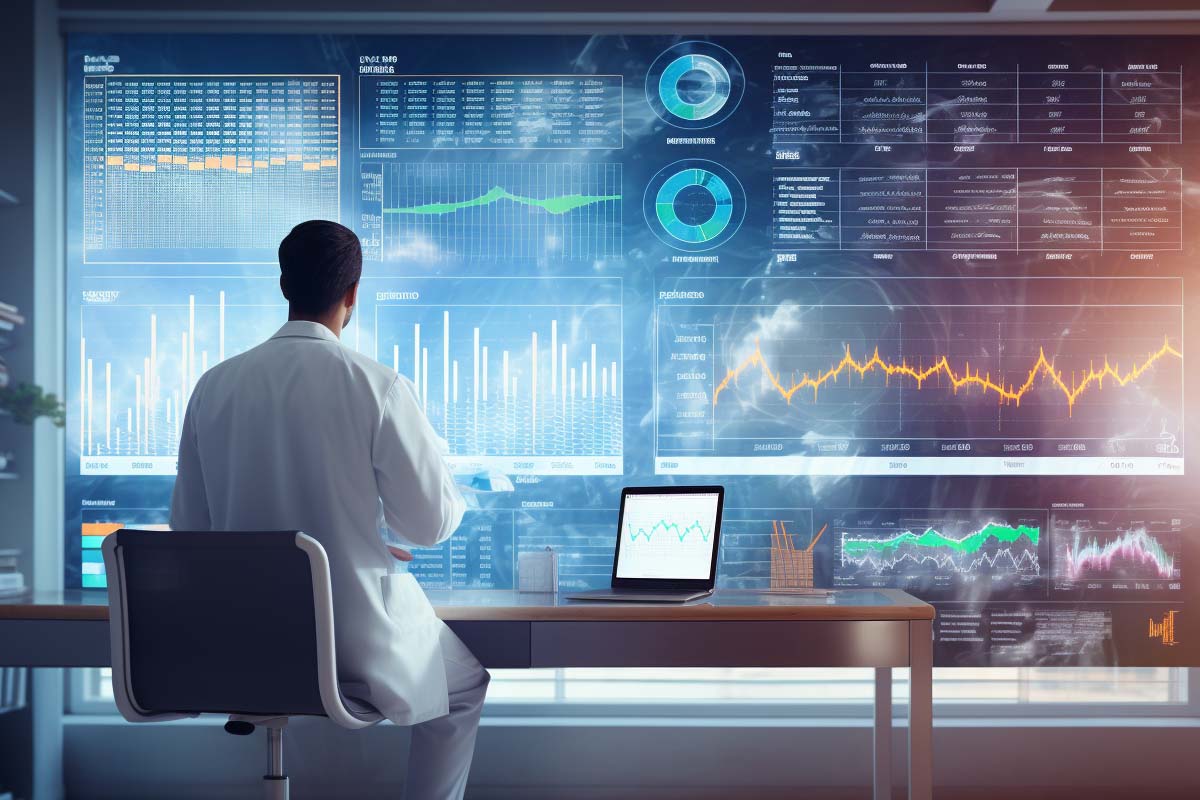What Is Read Committed?
Definition: Read CommittedRead Committed is an isolation level in database management systems that ensures any data read during a transaction is committed at the moment it is read. It prevents

Data Analytics in health care has become increasingly transformative. The health care industry is experiencing a significant transformation, largely due to the integration of data analytics. This evolution is changing the way patient care is approached, decisions are made, and resources are managed. From predicting disease patterns with predictive healthcare analytics to personalizing treatment plans, the benefits of leveraging health data analysis are manifold, making it an indispensable tool in modern health care practices.

Elevate your career with our Data Analyst Training Series. Master SQL, Excel, Power BI, and big data analytics to become a proficient Data Analyst. Ideal for aspiring analysts and professionals seeking to deepen their data skills in a practical, real-world context.
Several advanced tools and technologies are employed to handle the vast amounts of data in the health care industry:
The demand for skilled data analysts in the health care sector is on the rise, driven by the industry’s growing reliance on data-driven decision-making. This demand reflects the increasing importance of roles centered around health data mining and analysis in improving healthcare outcomes.
Data in health care is highly sensitive and its management is strictly regulated by laws and standards, ensuring medical data security:
The integration of data analytics in health care is not just transforming the industry by enabling more precise, efficient, and patient-centered care, but also by ensuring the protection and secure management of patient data through stringent health data regulations. As the sector continues to evolve, the need for robust health informatics and data analysis skills will only grow, promising a future where health care is more data-driven, efficient, and patient-focused than ever before.

An Information Security Analyst plays a pivotal role in safeguarding an organization’s digital infrastructure and sensitive data. This job involves a blend of technical expertise, vigilance, and continuous learning to protect against ever-evolving cyber threats.
| Key Term | Definition |
|---|---|
| Health Data Analysis | The process of examining, cleaning, transforming, and modeling health data with the aim of discovering useful information, suggesting conclusions, and supporting decision-making. |
| Predictive Healthcare Analytics | A branch of analytics that involves the use of historical data, machine learning, and algorithms to predict future outcomes within the healthcare sector. |
| Electronic Health Records (EHR) | Digital versions of patients’ paper charts. They contain patients’ medical history, diagnoses, medications, treatment plans, immunization dates, allergies, radiology images, and laboratory test results. |
| Health Information Technology (HIT) | The application of information processing involving both computer hardware and software that deals with the storage, retrieval, sharing, and use of health care information, data, and knowledge for communication and decision-making. |
| Clinical Data Analysis | The process of applying statistical and logical techniques to evaluate and improve the quality and efficiency of clinical care. |
| Healthcare Data Privacy | The practice of maintaining the confidentiality and availability of patient information. This involves handling, storing, and transmitting patient data in a manner that complies with all legal, ethical, and professional standards. |
| Big Data in Healthcare | Refers to the vast quantities of information created by the digitization of everything, that gets consolidated and analyzed by specific technologies. Applied to healthcare, it will use specific health data of a population (or of a particular individual) to potentially help prevent epidemics. |
| Medical Data Processing | Involves the handling, organizing, and analyzing of data obtained from various sources (including EHRs, medical imaging, genomic sequencing, payor records, pharmaceutical research, wearables, and medical devices). |
| Health Data Visualization | The representation of health data in a visual context, like a chart, diagram, picture, to help healthcare professionals understand complex data sets and to provide an accessible way to see and understand trends, outliers, and patterns in data. |
| Healthcare Business Intelligence | Refers to the use of data analysis tools and processes by healthcare organizations to make informed decisions that improve patient care, reduce costs, and streamline operations. |
| Health Information Systems | A comprehensive, integrated information system designed to manage the administrative, financial, and clinical aspects of a hospital or healthcare facility. |
| Personalized Healthcare Treatment | A medical model that proposes the customization of healthcare, with medical decisions, practices, or products being tailored to the individual patient. |
| Health Data Regulations (HIPAA, GDPR) | Set of regulations like HIPAA (Health Insurance Portability and Accountability Act) and GDPR (General Data Protection Regulation) that govern the use, sharing, and protection of personal health information. |
| Healthcare Machine Learning | The use of algorithms and statistical models by computers to perform tasks without using explicit instructions, relying on patterns and inference instead. It’s used in healthcare for various applications including treatment recommendation, disease identification, and personalized treatment. |
| Health Data Mining | The process of examining large databases to generate new information and predict future trends and behavior patterns, often with the aid of machine learning and other data analysis methods. |
These key terms provide a fundamental understanding of the concepts and practices when working with health care data, allowing professionals to navigate the complex landscape of health data analysis, management, and application in healthcare settings.

Your career in information technology last for years. Technology changes rapidly. An ITU Online IT Training subscription offers you flexible and affordable IT training. With our IT training at your fingertips, your career opportunities are never ending as you grow your skills.
Plus, start today and get 30 days for only $1.00 with no obligation. Cancel anytime.
Health care data analytics involves the systematic use of data and related business insights developed through applied analytical disciplines such as statistical, contextual, quantitative, predictive, cognitive, and other models to drive fact-based decision making for planning, management, measurement, and learning. It’s crucial in healthcare because it enables providers to offer personalized treatment, improve care quality, and enhance operational efficiency.
Predictive analytics in health care utilizes historical data, statistical algorithms, and machine learning techniques to identify the likelihood of future outcomes. It can predict potential medical events for patients, like hospital readmissions or potential health deteriorations, thereby enabling preventive care measures, reducing the likelihood of adverse events, and promoting personalized patient care.
Implementing health care data analytics faces several challenges, including ensuring data quality and integrity, integrating disparate data sources, complying with strict data privacy and security regulations like HIPAA and GDPR, managing the high costs of advanced analytical tools and technologies, and addressing the shortage of skilled professionals in health care data analytics.
Health care data analytics tools ensure the privacy and security of patient data by adhering to strict standards and regulations like HIPAA and GDPR. They implement robust security measures such as data encryption, access controls, and regular security audits. Additionally, these tools often include features for anonymizing sensitive data, ensuring that patient privacy is maintained while enabling the valuable insights that can be derived from the data.
The future outlook for health care data analytics is very promising, with continuous advancements in technologies like AI, machine learning, and big data platforms. These technologies are expected to further refine the predictive capabilities of analytics, leading to more personalized and efficient patient care. The integration of real-time data analytics and telehealth is also anticipated, offering more proactive and preventive health care solutions. However, the success of these advancements will depend on addressing current challenges, such as data privacy concerns, integration of various data sources, and ensuring the availability of skilled professionals.
Lorem ipsum dolor sit amet, consectetur adipiscing elit. Ut elit tellus, luctus nec ullamcorper mattis, pulvinar dapibus leo.
$49.99 Original price was: $49.99.$16.99Current price is: $16.99. / month with a 10-day free trial
Definition: Read CommittedRead Committed is an isolation level in database management systems that ensures any data read during a transaction is committed at the moment it is read. It prevents
Definition: Guarded Command LanguageGuarded Command Language (GCL) is a programming language designed by Edsger Dijkstra for describing algorithms in a precise and structured manner. GCL emphasizes the use of guards
Definition: Enterprise ApplicationAn enterprise application is a large-scale software system designed to operate in a corporate environment such as business or government. These applications are complex, scalable, distributed, component-based, and
Definition: Integration TestingIntegration testing is a crucial phase in software testing where individual software modules are combined and tested as a group. The primary goal is to detect any issues
Definition: Thin ClientA thin client is a lightweight computer that relies on a server to perform most of its computational tasks. It typically handles input and output operations while the
Definition: EF Core (Entity Framework Core)EF Core (Entity Framework Core) is a modern, open-source, and cross-platform version of the popular Entity Framework data access technology. It is a lightweight, extensible,
Definition: Link-Local AddressA link-local address is a type of IP address that is used for communication between devices on the same network segment or link. These addresses are automatically configured
Definition: Transaction LogA transaction log is a file—or a set of files—used to record the history of database transactions. This log captures all changes made to the database, allowing for
Definition: Infinite LoopAn infinite loop is a sequence of instructions in a computer program that loops endlessly without a terminating condition or a break to exit the loop. This results
Definition: LUN MaskA LUN (Logical Unit Number) mask is a security feature in storage area networks (SANs) that controls access to storage devices. It allows administrators to specify which servers
Definition: Linear ProgrammingLinear Programming (LP) is a mathematical method for determining a way to achieve the best outcome in a given mathematical model. Its functions are represented in linear relationships.
Definition: Quality of Experience (QoE)Quality of Experience (QoE) refers to the overall level of satisfaction or dissatisfaction a user feels when using a particular product, service, or application. It encompasses
ENDING THIS WEEKEND: Train for LIFE at our lowest price. Buy once and never have to pay for IT Training Again.

Get ready for the updated 220-1201 & 220-1202 exams with our brand-new CompTIA A+ training—designed to help you pass with confidence and start your IT career strong. Access this course and over 2,900 hours of expert-led IT training when you sign up for any of our All-Access Passes. Don’t miss out—enroll now and start learning today!